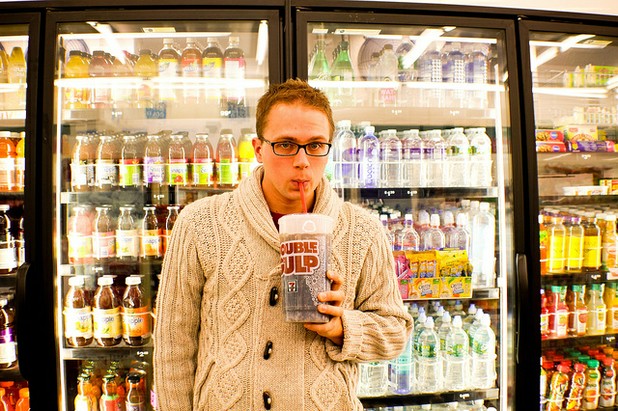- Story Highlights
-
- Diet Drinks Linked to Depression: People who drank 4 or more sodas a day were 31% more likely to get depressed
- Or - Some Experts Think That Depressed People Just Crave Sweetness: Some experts say that people shouldn't make a big deal out of these study results - that it might just be that people who are already depressed crave certain tastes more.
Study Finds Linkage between Diet Drinks and Depression
Comments (2)In a study which shows an association, but no causality – researchers find that people who drink 4 or more cans of diet soda per day are 31% more likely to get depression than people who do not drink sweetened beverages.
Do diet sodas and fruit drinks cause depression?
Well, researchers presenting findings at the American Academy of Neurology’s 65th Annual Meeting in San Diego later this year won’t go as far as saying that, but they do say that there’s a noteworthy linkage between increased diet drink consumption and an increased prevalence of depression.
More coffee drinking, by the way, seems to slightly lower a person’s risk of depression.
The Study
- NIH researchers polled more than 250 000, 50 to 71 year old study subjects about their drinking habits during 1995 and 1996.
- 10 years later, researchers followed up with all subjects to find out how many had been diagnosed with depression since the year 2000.
The Results
- 11 311 of the 263 925 subjects had been diagnosed with depression
Compared to people who did not regularly drink sweetened drinks:
- People who drank 4 or more cans of diet soda per day were 31% more likely to have been diagnosed with depression (People who drank 4 or more cans of regular soda were 22% more likely)
- People who drank 4 or more cans of diet fruit drinks per day were 51% more likely to have been diagnosed with depression
People who drank 4 or more cups of coffee per day were 10% less likely than non coffee drinkers to have been diagnosed with depression.
The Commentary
The researchers state, "Our research suggests that cutting out or down on sweetened diet drinks or replacing them with unsweetened coffee may naturally help lower your depression risk More research is needed to confirm these findings, and people with depression should continue to take depression medications prescribed by their doctors."
They also stress that that although results show an association between sweetened drinks and an increased incidence rate of depression – there is no way of knowing from this study whether consumption of sweetened drinks causes an increased depression risk.
As an alternate theory, some experts have suggested that depression may lead to increased cravings for sweetened foods and drink s and this is a more plausible explanation for the association than suggestions that sweetened drinks might cause depression in some way.


